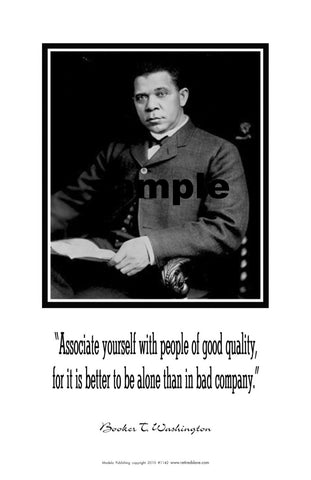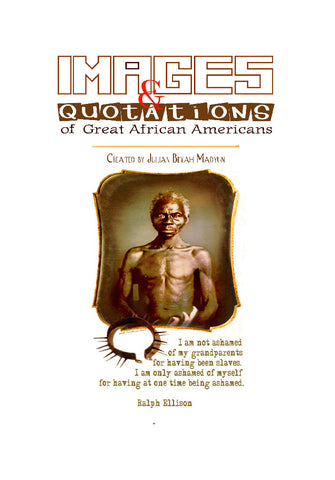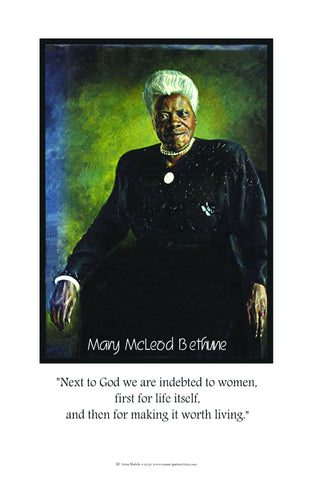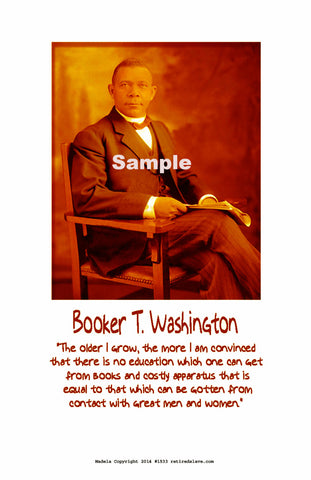Richard Wright #1370
$ 8.00
Caption from poster__
" Men can starve from a lack of self-realization
as much as they can from a lack of bread."
Wright, Richard (4 Sept. 1908-28 Nov. 1960), author, was born Richard Nathaniel Wright on Rucker's Plantation, between Roxie and Natchez, Mississippi, the son of Nathaniel Wright, an illiterate sharecropper, and Ella Wilson, a schoolteacher. When Wright was five, his father left the family and his mother was forced to take domestic jobs away from the house. Wright and his brother spent a period at an orphanage. Around 1920 Ella Wright became a paralytic, and the family moved from Natchez to Jackson, then to Elaine, Arkansas, and back to Jackson to live with Wright's maternal grandparents, who were restrictive Seventh-day Adventists. Wright moved from school to school, graduating from the ninth grade at the Smith Robertson Junior High School in Jackson as the class valedictorian in June 1925. Wright had published his first short story, "The Voodoo of Hell's Half-Acre," in three parts in the Southern Register in 1924, but no copies survive. His staunchly religious and illiterate grandmother, Margaret Bolden Wilson, kept books out of the house and thought fiction was the work of the devil. Wright kept any aspirations he had to be a writer to himself after his first experience with publication. After grade school Wright attended Lanier High School but dropped out after a few weeks to work; he took a series of odd jobs to save enough money to leave for Memphis, which he did at age seventeen. While in Memphis he worked as a dishwasher and delivery boy and for an optical company. He began to read contemporary American literature as well as commentary by H. L. Mencken, which struck him with particular force. As Wright reveals in his autobiography Black Boy, he borrowed the library card of an Irish co-worker and forged notes to the librarian so he could read: "Dear Madam: Will you please let this nigger boy have some books by H. L. Mencken?" Determined to leave the South before he would irretrievably overstep the bounds of Jim Crow restrictions on blacks, Wright took the train to Chicago in December 1927. In Chicago Wright worked at the post office, at Michael Reese Hospital taking care of lab animals, and as an insurance agent, among other jobs. There, in 1932, he became involved in the John Reed Club, an intellectual arm of the Communist party, which he joined the next March. By 1935 he found work with the Federal Negro Theater in Chicago under the Federal Writers' Project. He wrote some short stories and a novel during this time, but they were not published until after his death. In 1937 Wright moved to New York City, where he helped start New Challenge magazine and was the Harlem editor of the Daily Worker as well as coeditor of Left Front. Wright's literary career was launched when his short story collection, Uncle Tom's Children (1938), won first prize for the Story magazine contest open to Federal Writer's Project authors for best book-length manuscript. Harper's published this collection with "Fire and Cloud," "Long Black Song," "Down by the Riverside," and "Big Boy Leaves Home"; in 1940 the story "Bright and Morning Star" was added, and the book was reissued. Native Son followed in 1940, the first bestselling novel by a black American writer and the first Book-of-the-Month Club selection by an African-American writer. It sold 215,000 copies in its first three weeks of publication. Native Son made Wright the most respected and wealthiest black writer in America; he was awarded the National Association for the Advancement of Colored People's prestigious Spingarn Medal in 1941. After Uncle Tom's Children, Wright declared in "How Bigger Was Born" that he needed to write a book that bankers' daughters would not be able to "read and feel good about," that would "be so hard and deep that they would have to face it without the consolation of tears"; Native Son is uncompromising. In Native Son, Wright presents his guilt-of-the-nation thesis. His main character, Bigger Thomas, is a nineteen-year-old edgy small-time criminal from Chicago's South Side ghetto. The novel races with no stops in between the three parts: Book I, Fear; Book II, Flight; and Book III, Fate. When Bigger is offered a job as a chauffeur for a wealthy white family, he imagines himself in various fanciful scenarios, including sexual ones with the daughter. Lines that referred to Bigger's sexual interest in Mary Dalton were taken out in 1940 and only restored fifty-three years later in the 1993 Library of America edition, edited by Arnold Rampersad and copyrighted by Wright's second wife, Ellen Wright. Bigger's first driving job requires him to take Mary to pick up her communist lover, Jan Erlone, then eat with the couple in a black diner on the South Side. They drink themselves into oblivion on the ride home and invite Bigger to join them. Jan leaves, and Bigger must take Mary home and put her in bed. Terrified to be in Mary's bedroom and afraid to be caught as he is kissing her, he puts a pillow over her face when her blind mother walks in. Realizing he has accidentally murdered her, he drags her in a trunk to the basement and burns her in the furnace. Bigger rationalizes, correctly for a while, that the whites will never suspect him because they will think he is not smart enough to plan such a crime. As it begins to snow, Bigger leaves the Dalton house and returns to his mother's tenement feeling like a new man. Bigger now sees that everyone he knows is blind; he himself is filled with elation for having killed a white girl, the ultimate taboo, and gotten away with it. To seal his guilt, Wright has Bigger murder his girlfriend Bessie in a brutal and premeditated way, in Book II. As the snowfall becomes a blizzard, Bigger is surrounded by the white world, whose search closes in and captures him. At the trial in Book III Bigger is never convicted for Bessie's murder, but only for the assumed rape of Mary, deemed to be a more serious crime than even Mary's murder. Boris A. Max, a Communist party lawyer, undertakes Bigger's defense because Bigger has implicated Jan and the party in a kidnap note to the Daltons. While Wright made blacks proud of his success, he also made them uncomfortable with the protagonist, Bigger, who is a stereotype of the "brute Negro" they had been trying to overcome with novels of uplift by the "talented tenth" since the Gilded Age. Wright's argument is that racist America created Bigger; therefore, America had better change or more Biggers would be out there. At the end, when Max fails to understand Bigger, who cannot be saved from the electric chair, Wright is faulting the Communist party for not comprehending the black people it relied on for support. (Personally disillusioned with the party, Wright left it in 1942 and wrote an essay published in Atlantic Monthly in 1944 called "I Tried to Be a Communist," which was later reprinted in The God That Failed (1949), a collection of essays by disillusioned ex-Communists.) Native Son continues to be regarded as Wright's greatest novel and most influential book. As a result, he has been called the father of black American literature, a figure with whom writers such as James Baldwin had to contend. To divest himself of Wright's influence, Baldwin wrote a series of three essays criticizing Wright's use of naturalism and protest fiction. In "Everybody's Protest Novel," published in Partisan Review in 1949, Baldwin concludes, "The failure of the protest novel lies in its rejection of life, the human being, the denial of his beauty, dread, power, in its insistence that it is his categorization alone which is real and which cannot be transcended." On the other hand, Wright has been credited with presaging the Black Arts Movement of the 1960s, particularly in his protest poetry, much of which was published in Chicago in the 1930s. As Irving Howe said in his 1963 essay "Black Boys and Native Sons," "The day Native Son appeared, American culture was changed forever. No matter how much qualifying the book might later need, it made impossible a repetition of the old lies . . . [and] brought out into the open, as no one ever had before, the hatred, fear, and violence that have crippled and may yet destroy our culture." As Wright was rising to prominence, his personal life was going through changes as well. In 1939 he had married Dhimah Rose Meadman, a Russian-Jewish ballet dancer. Wright moved her, her son, her mother, and her pianist to Mexico for a few months and then realized the marriage was not a success. He returned to New York and divorced Dhimah in 1940. On the trip back to New York, Wright stopped to visit his father for the first time in twenty-five years. In Black Boy, he describes his father during this visit as "standing alone upon the red clay of a Mississippi plantation, a sharecropper, clad in ragged overalls, holding a muddy hoe in his gnarled, veined hands . . . when I tried to talk to him I realized that . . . we were forever strangers, speaking a different language, living on vastly distant planes of reality." In 1941 he married Ellen Poplar, a white woman and Communist party member with whom he had worked and been in love before he married Dhimah. A year later their first daughter was born. Their second daughter was born in Paris in 1949. During 1940-1941 Wright collaborated with Paul Green to write a stage adaptation of Native Son. It ran on Broadway in the spring of 1941 and was produced by John Houseman and staged by Orson Welles. Simultaneously, Wright published his sociological-psychological treatise Twelve Million Black Voices: A Folk History of the Negro in the United States (1941), with photographs collected by Edwin Rosskam; the book was well received. His autobiography, Black Boy, came out in 1945, again a bestseller and Book-of-the-Month Club selection, although the U.S. Senate denounced Black Boy as "obscene." The later section about his life in Chicago and experience with the Communist party was not published until 1977 under the title American Hunger. Wright's publishers in 1945 had only wanted the story of his life in the South and cut what followed about his life in the North. There have been numerous biographies of Wright, but all must begin with Black Boy, Wright's personal and emotional account of his childhood and adolescence in the Jim Crow South. In a famous passage in the autobiography that has bothered critics and set Wright apart from the African-American sense of community, he asserts the "cultural barrenness of black life": " . . . I used to mull over the strange absence of real kindness in Negroes, how unstable was our tenderness, how lacking in genuine passion we were, how void of great hope, how timid our joy, how bare our traditions, how hollow our memories, how lacking we were in those intangible sentiments that bind man to man, and how shallow was even our despair." He found an "unconscious irony" in the idea that "Negroes led so passional an existence": "I saw that what had been taken for our emotional strength was our negative confusions, our flights, our fears, our frenzy under pressure." Statements like these are contradicted by others that describe a caring community. For example, when Wright's mother suffers a paralytic stroke, "the neighbors nursed my mother day and night, fed us and washed our clothes," and Wright admits to being "ashamed that so often in my life I had to be fed by strangers." In 1946 Wright was invited to France. After he returned to the United States he decided he could no longer tolerate the racism he experienced even in New York City. Married to a white woman and living in the North, he still was not able to buy an apartment as a black man; furthermore, he hated the stares he and his family received on the streets. And he was still called "boy" by some shopkeepers. So in 1947 he moved permanently to France and settled in Paris. Wright never again saw the United States. He worked during 1949-1951 on a film version of Native Son, in which he himself played Bigger. Wright, forty years old and overweight, had to train and stretch verisimilitude to play the nineteen-year-old Bigger. During filming in Buenos Aires and Chicago, the production was fraught with problems. The film was released briefly but was unsuccessful. European audiences acclaimed it, but the abridged version failed in the United States and the film disappeared. Wright did not publish a book after Black Boy until 1953 when his "existential" novel, The Outsider, was published to mixed reviews. Cross Damon, the main character, is overwhelmed by the demands of his wife, his mother, and his mistress. Seizing a chance opportunity during a train crash, he leaves his identity papers with a dead man and disappears. He ends up committing three murders to save himself, then is himself murdered by the Communist party in the United States for his independence. Savage Holiday followed in 1954, a "white" novel whose main character, Erskine Fowler, exemplifies the dangers of repressed emotion. Fowler has been obsessed with desire for his mother. He marries a prostitute, then murders her; the graphic murder scene disturbed some readers. The novel is an exception to Wright's work in that it has no black characters. Savage Holiday was not even a mild critical success. During the mid-1950s Wright traveled extensively--to Africa, Asia, and Spain--and wrote several nonfiction works on political and sociological topics. He had helped found Présence Africaine with Aimé Césaire, Leopold Senghor, and Alioune Diop during 1946-1948. He spent some time in Ghana and in 1954 published Black Power (a term coined by Wright) to mixed reviews. Black Power concerns itself with the color line in Africa and the new "tragic elite," the leaders of the former colonies. Ghanaian writer Kwame Anthony Appiah said later that Wright failed to understand Africans when he urged Africa to leave tribal custom behind and join the technological era. In April 1955 Wright attended the Bandung Conference in Indonesia, the first meeting of twenty-nine new nations of Africa and Asia. He published his account as The Color Curtain in 1956 (after the French edition of 1955). Throughout his international political activities, Wright knew correctly that he was being shadowed by the Central Intelligence Agency; his paranoia was later justified when evidence about his surveillance was made available under the Freedom of Information Act. After Wright made two trips to Franco's Spain, he published a book of his observations, Pagan Spain (1956); here Wright with his "peasant" understanding exposes the dark side of violence and moral hypocrisy beneath the national adherence to Catholicism. In 1957 he put together a collection of his lectures given between 1950 and 1956 in Europe, White Man, Listen!, which includes "The Literature of the Negro in the United States," an important overview. Wright's books published during the 1950s disappointed some critics, who said that his move to Europe alienated him from American blacks and thus separated him from his emotional and psychological roots. During the 1950s Wright grew more internationalist in outlook. While he accomplished much as an important public literary and political figure with a worldwide reputation, his creative work did decline. The last work Wright submitted for publication during his lifetime, The Long Dream, a novel, was released in 1958. Here he portrays his strongest black father, Tyree Tucker, and treats the black middle class in the setting of Clintonville, Mississippi. This was the first novel in a planned trilogy about Tyree Tucker and his son Fishbelly. Wright did finish the second novel, "Island of Hallucinations," about Fishbelly's escape to Paris, but it was not published. The Long Dream, taking place in the long-gone South of the 1940s, seemed out of date to readers; critics faulted Wright for being away from the source of his material for too long, and Time magazine criticized him for "living amid the alien corn." Subsequent critics, however, have regarded his late fiction more seriously. In 1959 Wright's Daddy Goodness was staged in Paris in collaboration with Louis Sapin, and a 1960 Broadway stage version of The Long Dream, produced by Ketti Frings, was unsuccessful. During his last year and a half, Wright suffered from amoebic dysentery acquired during his travels to Africa or Asia, and he died suddenly of an apparent heart attack while recuperating at the Clinique Eugène Gibez in Paris. There have been recurrent rumors that Wright was murdered, but this has not been substantiated. After his death, his wife Ellen submitted for publication his second collection of short stories, Eight Men (1961), which Wright had completed eight years earlier. She then published his novel Lawd Today in 1963, generally considered to be the least powerful of Wright's works, although William Burrison has argued for its sophistication and artistic merit ("Another Look at Lawd Today," CLA Journal 29 [June 1986]: 424-41). Lawd Today, clearly influenced by James Joyce's Ulysses, presents one day in the life of Jake Jackson in Chicago. Wright had finished this manuscript in 1934, titled it Cesspool, and had had it repeatedly rejected by publishers before Native Son was released. The unexpurgated 1993 edition of Native Son saddles readers with an even less sympathetic Bigger Thomas, ensuring this novel's role in confronting future generations of complaisant Americans about the scourge of race and fulfilling W. E. B. Du Bois's prophecy in The Souls of Black Folk (1903) that "the problem of the twentieth century is the problem of the color line." Bibliography.




